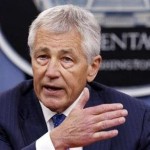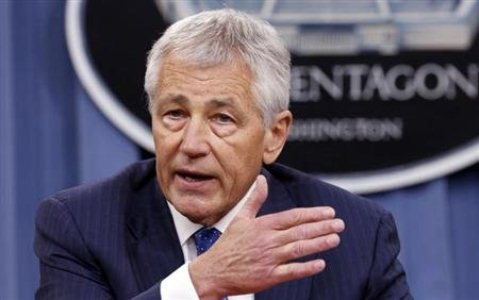 PENTAGON�� U.S. Defense Secretary Chuck Hagel is wrapping up a trip to the Middle East - where he delivered a $10 billion weapons package to Israel and some of Washington's Arab allies as a sign of U.S support in the face of Iranian threats.
PENTAGON�� U.S. Defense Secretary Chuck Hagel is wrapping up a trip to the Middle East - where he delivered a $10 billion weapons package to Israel and some of Washington's Arab allies as a sign of U.S support in the face of Iranian threats.Secretary Hagel's visit to Israel could have been awkward.� He was accused of being anti-Israel during his nomination hearing.� But he got a warm welcome as did the weapons package he took with him.
�The United States will make available to Israel a set of advanced new military capabilities, including anti-radiation missiles and advanced radars for its fleet of fighter jets, KC-135 refueling aircraft, and most significantly, the V-22 Osprey, which the U.S. has not released to any other nation," Hagel said.
The offerings are a clear sign to Iran which poses the biggest threat to Israel and the values it shares with the U.S. - as Hagel was reminded by Prime Minister Benjamin Netanyahu.
�Nowhere are these values and interests challenged more than by the arming of terrorist groups by Iran with sophisticated weapons, and equally, Iran's attempt to arm itself with nuclear weapons,� Netanyahu said.
A big challenge for Israel is the distance its jets would have to travel to hit Iranian nuclear targets, if it chose to do that.� The new refueling aircraft will help close the gap, says defense analyst Tim Brown.
�The refueling tankers give the Israelis the ability to do the strike regardless of the range of any specific aircraft,� Brown said.
But Washington continues to oppose a unilateral Israeli strike.
Not included in this package are the U.S.' earth-penetrating bombs that Israel could use to attack Iranian underground facilities.� And analyst Anthony Cordesman says Israel does not have the larger aircraft required to deliver those weapons.
�I don't think anyone, when they pause, is going to say that the United States should be transferring Stealth bombers to anyone, even its closest allies, particularly when those bombers cost the United States over a billion dollars a plane,� Cordesman said.
Hagel's stops in the region included visits and weapons offers to Saudi Arabia and the United Arab Emirates, a sign the U.S also wants to help its Arab partners counter any future threats from Iran.
By VOA
The Iran Project is not responsible for the content of quoted articles.











